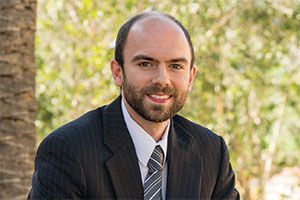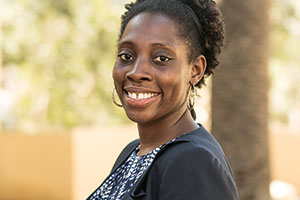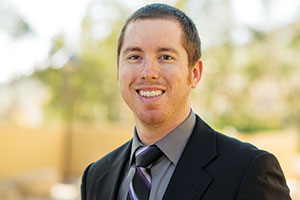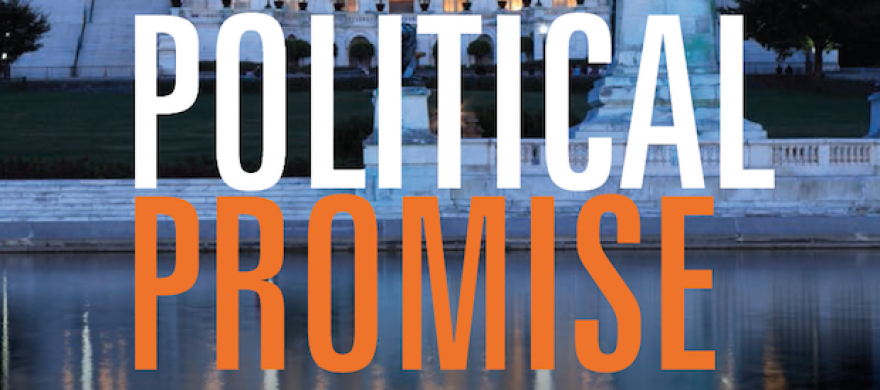Political Promise
The School of Public Policy summer internship program enables students to explore their passions in Washington, D.C., and beyond.
While many public policy scholars pursue degrees to set themselves up for a career on Capitol Hill, the opportunities that exist in the public and private sectors are endless.
At the School of Public Policy, students pursuing a master of public policy (MPP)
are given a dynamic internship opportunity to gain hands- on experience in agencies
related to his or her area of specialization, including local, state, or federal government;
nonprofit organizations; or foreign agencies. Though the 240-hour internship is a
requirement for all students prior to their second year of study, program director
Diane Yaris Adkins stresses the benefits of the invaluable skills it provides to students
as they continue their professional lives.
“A career in policy is not limited to politics,” she explains. “We have students working
on political campaigns, yes, but they are also doing work in corporate social responsibility
and grassroots organizations. This degree is so broad ... it can take you anywhere.”
Read how far the master of public policy internship program took some of its most
recent participants. Ben Peterson
Ben Peterson
Placement: Al Amana Center
Location: Muscat, Oman
Muscat, the capital of Oman—one of the Gulf States and one of the only two sultanates
in the world—is not a place that comes to Americans’ attention very often. While searching
for an experience to further his study of Arabic, especially in a predominantly Muslim
country, second-year MPP candidate Ben Peterson was placed in an internship at the
Al Amana Center, an institution working to foster positive dialogue and personal relationships
between Christians and Muslims.
Much of his time at Al Amana was spent researching different conflict zones where
religious leaders and community members play a role in peacemaking, such as Nigeria
or the Central African Republic. He also discussed how to pursue peace in divided
situations with Doug Leonard, Al Amana’s executive director.
“We came up with a game we called ‘War and Peace’ that illustrated the different dynamics
that might be in play in these zones,” Peterson recalls.
Peterson would attend Arabic language classes in the morning, spend his afternoons
doing research for Al Amana, and discuss ideas for a religion and diplomacy training
center. He also spent much of his time learning about Ibhadi Islam, the sect prevalent
in Oman, as well as some of the challenges associated with interfaith dialogue.
“There is so much to learn about the challenges and rewards of pursuing true dialogue,”
he recalls. “This whole field of religious peacemaking and faith-based diplomacy was
totally new to me.”
He was especially intrigued by the most marked difference between Western and Islamic
civilizations: the relationship between religion and politics.
“That’s why I ended up studying foreign policy,” explains Peterson, “especially how
we, in the American culture, manage our relationships with the Middle East.”
“Islam is probably the fastest growing world religion and will be a major dynamic
in the 21st century and years to come,” he continues. “I don’t think we have a good
understanding of it or the complexity of the situations of the people living in Arab
countries. It was an interesting time to be in Oman.”
With the research and communication skills that he gained while at Pepperdine, including
which types of questions to ask during interfaith dialogues and faith-based diplomacy;
the knowledge he gained in
the Saudi Arabia class taught by Karen Elliott House, the Spring 2014 William E. Simon
Distinguished Visiting Professor; and the study of economics that play a role in understanding
the intersection of the various dynamics that are at work, Peterson is confident that
he successfully applied his Pepperdine education overseas.
“That is something the School of Public Policy is especially attuned to: all of the
different dynamics that affect public issues, and an awareness of the philosophical
traditions that are in play.” Jennifer Kamara (MPP '15)
Jennifer Kamara (MPP '15)
Placement: U.S. Government Accountability Office
Location: Washington, DC
Most public policy hopefuls do not enter the field hoping to become a policy analyst,
according to recent School of Public Policy graduate Jennifer Kamara. With her heart
firmly rooted in the nonprofit sector, she was ultimately interested in the qualitative
and quantitative research and analysis opportunities offered by an internship at the
U.S. Government Accountability Office (GAO).
Kamara learned of the GAO while perusing source materials for a project she worked
on during her first semester at Pepperdine. “I never thought it could actually be
a job,” she recalls. “I can get paid to do what I really like to do.” She set up an
alert on the USAJOBS website and applied during their open period.
A career in public policy became apparent prior to coming to Pepperdine, when Kamara
participated in the nine- month Coro Fellowship in public affairs. She deferred graduate
school in order to rotate between different sectors in public affairs. The experience
sparked an interest in the multitude of jobs available in public policy.
“I went into the public policy program at Pepperdine with an open mind once I started
to see the possibilities,” she recalls.
Her first week as a GAO intern was memorable. Kamara was sent to Capitol Hill for
a meeting on various funding and privatization methods for infrastructure improvements,
and walked right into New Jersey junior senator Cory Booker. “That’s my idea of a
celebrity!” she says. “I realized at that moment exactly where I was. I thought, ‘Wow,
I’m actually here! I’m working for Congress!’ I realized how big it was that I was
actually there and my work would be used to advise those people.”
Though her title was “intern,” she felt like part of the team who was trusted with
the same level of work as the full-time employees. “I was writing reports, briefing
congresspersons and their staff, and presenting to senior staff,” she says. “There
was a high level of trust.”
As an analyst, Kamara worked with the Physical Infrastructure Team on airport privatization
in the U.S. The team develops reports and testimonies that help Congress, federal
agencies, and the public ensure the efficiency, safety, and security of the nation’s
infrastructure. Kamara’s job initially was to examine public information on the airport-privatization
pilot program and organize that information into a spreadsheet that would later be
used by the team to write their own reports. Her responsibilities ultimately grew.
Kamara is currently part of the Strategic Issues Team, under the strategic and performance
management issue area, which works to assist Congress in addressing governance and
management challenges across all agencies.
As far as her future, she is clear about one thing: “I obviously want to be one of
those smart policy wonks,” she says, with a laugh. “Whatever team I end up on, I want
to be an expert in that area and I want to continue to do good work with smart people.”
“The internship component of our program is so important,” she stresses. “I think
ideally it’ll work out that you intern someplace and get a job, but it could also
be that you intern someplace and realize it’s not what you want to do. For me, it
solidified the fact that I wanted
to pursue a career in public policy. I don’t know if I’d be so certain if I hadn’t
done that internship.” Ryan Tenney (MPP '15)
Ryan Tenney (MPP '15)
Placement: Ventura County Sheriff’s Department, Office of Emergency Services
Location: Ventura, California
After getting a taste of the federal government in Washington, DC, as a congressional
intern at the U.S. House of Representatives as a college student, and working as a
staff assistant for the U.S. Senate at the district level following graduation, Ryan
Tenney was interested in further exploring the public sector through an internship
with local government. He was introduced to the field in a homeland security seminar
course with former Ventura County sheriff Bob Brooks he took while studying at the
School of Public Policy, in which he was assigned a project to develop an emergency
response plan to a disaster scenario.
“When I thought of emergency management, I didn’t realize that there are local government
agencies that specifically focus on that,” Tenney explains. “The project gave me a
chance to see how it is in the real world, and not only the theoretical application
of it. This gave me an opportunity to see the practical application of everything
we had learned in class.”
Though Tenney was already interning at a public affairs firm in the private sector,
a conversation with alumnus Kevin McGowan (MPP ’10), manager of the Office of Emergency
Services (OES) in the Ventura County Sheriff’s (VCS) Office, piqued his interest.
He was presented with the perfect opportunity to strengthen his skills and gain exposure
in a field he was not familiar with.
At the OES, Tenney was tasked with drafting an addendum to Ventura County’s central
emergency management plan and condensing the lengthy document. He spent countless
hours on historical comparative analysis, poring over emergency plans from around
the state and country, and taking online courses offered by FEMA to become certified
in skills and knowledge specific to the field. He learned about hierarchy, jurisdictions,
and chains of command at local government agencies. His focus was determining which
departments and agencies would mobilize in an emergency and developing a plan for
designated facilities in Ventura County at which individuals, businesses, and families
could access recovery programs and services in the event of a catastrophe.
“I wanted to write it to the best of my ability, because I realized the significance
of the document,” he explains. “It’s something that’s meant to help people and help
emergency service responders. It was very important that I got it right.”
When a mudslide threatened the city of Camarillo this past January, the OES shared
Tenney’s plan with the city, portions of which were implemented during the disaster.
“It made me feel respected, valued, motivated, and proud of my work being part of
a team,” says Tenney. “I was in a place where people saw my potential and gave me
an opportunity to prove myself.”
“It’s hard to get those opportunities being an intern,” he continues, “but I was in
a selfless environment where it was all about the mission. Coming from a established,
challenging graduate program at Pepperdine helped prepare me even more for the opportunity
to not only contribute, but also make a difference no matter how big or small the
contribution was.”
